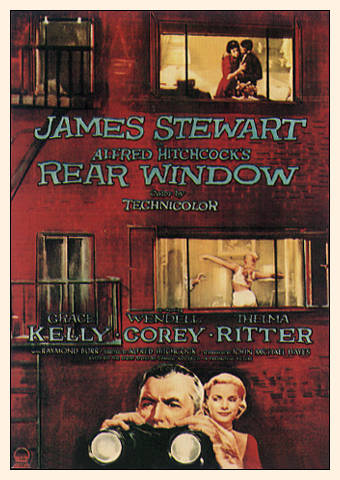
|
Rear Window
Writers:
John Michael Hayes, Cornell Woolrich (novel)
Composer:
Franz Waxman
Director of Photography: Robert Burks
Cast:
| Ross Bagdasarian |
Songwriter |
| Sara Berner |
Woman on Fire Escape |
| Raymond Burr |
Lars Thorwald |
| Frank Cady |
Man on Fire Escape |
| Wendell Corey |
Thomas J. Doyle |
| Georgine Darcy |
Miss Torso |
| Judith Evelyn |
Miss Lonely Hearts |
| Jesslyn Fax |
Sculptress |
| Rand Harper |
Honeymooner |
| Grace Kelly |
Lisa Fremont |
| Thelma Ritter |
Stella |
| James Stewart |
Jeff (L. B. Jeffries) |
|
I was feeling very creative at the time," Alfred Hitchcock said about Rear Window. "The batteries were well charged." So well charged, it seems, that he was able to produce a motion picture to satisfy even the most bored, cynical, and detached spectator -- someone like the hero himself.
The rear window looks out from a small apartment in crowded Greenwich Village, New York City. There a freelance travelling photographer named L. B. Jeffries -- called Jeff by his friends -- is confined to a wheelchair, his leg immobilized in a heavy plaster cast after a serious injury sustained while on assignment. With little to distract him from acute boredom and from the challenge to his maturity and commitment presented by his longtime girlfrieng Lisa Freemont, he spies on all the neighbors in apartments nearby. These observations lead him to suspect that a travelling salesman named Lars Thorwald has murdered his invalid wife. At first the evidence is so sketchy that Jeff can convince neither Lisa nor his detective friend Tom Doyle. But at last Jeff is helped by Lisa and by his visiting nurse Stella, who become his "legs". They discover sufficient material evidence to bring in the police -- and at the same time Jeff is mightily impressed by Lisa's pluck and daring.
Rear Window certainly succeeds as a light comedy-thriller, and anyone asking only for that level of entertainment is certainly supremely rewarded. But the script by John Michael Hayes is multileveled, with nearly every line of dialogue and each episode containing several rich aspects for consideration. To approach the film only as a light diversion may be in fact (Hitchcock implies) indict a viewer, along with Jeff, as one who merely peers at the lives of others from a distance and leaves unexamined his own inner life.
The film may profitably be studied from several angles. First, Jeff and we watch, through his rear window, the projections of his and our minds as the possibilities of a serious relationship develop with Lisa. In this regard, the entire first third of the film concerns that relationship, which is then explored with each male-female couple they and we see in the other apartments. Second, there is the subtheme of the indictment of voyeurism and the suspicion that prying into others' lives corrupts the ideal of neighborly love. Third -- and this is Rear Window's most subtle theme -- there is the issue of the moral responsibilities incumbent on a man devoted to picture-taking: photographers first of all but, by logical extension, filmmakers too. "Jeff" is in fact a surrogate for "Hitch" in this regard: chair-bound, he takes up a camera with a telephoto lens and then field glasses, through which he peers into the rectangular windows of his neighbors and sees people, gives them names, makes up stories about them, tells others these stories, and then directs a "crew" (Lisa, Stella, Doyle) he sends forth onto the "set". Rear Window is, on this level, nothing so much as a movie about moviemaking Hitchcock-style. And forth, there is a compassionate but distinctly antiromantic treatment of erotic intimacy in Rear Window -- something necessary for some people, Hitchcock seems to say (here as elsewhere), but a human reality freighted with danger, dread, and uncertainty.
Back to Pete's Pad |
Movies Page |
Hitchcock
Text copyright © Donald Spoto, The Art of Hitchcock, 1974.